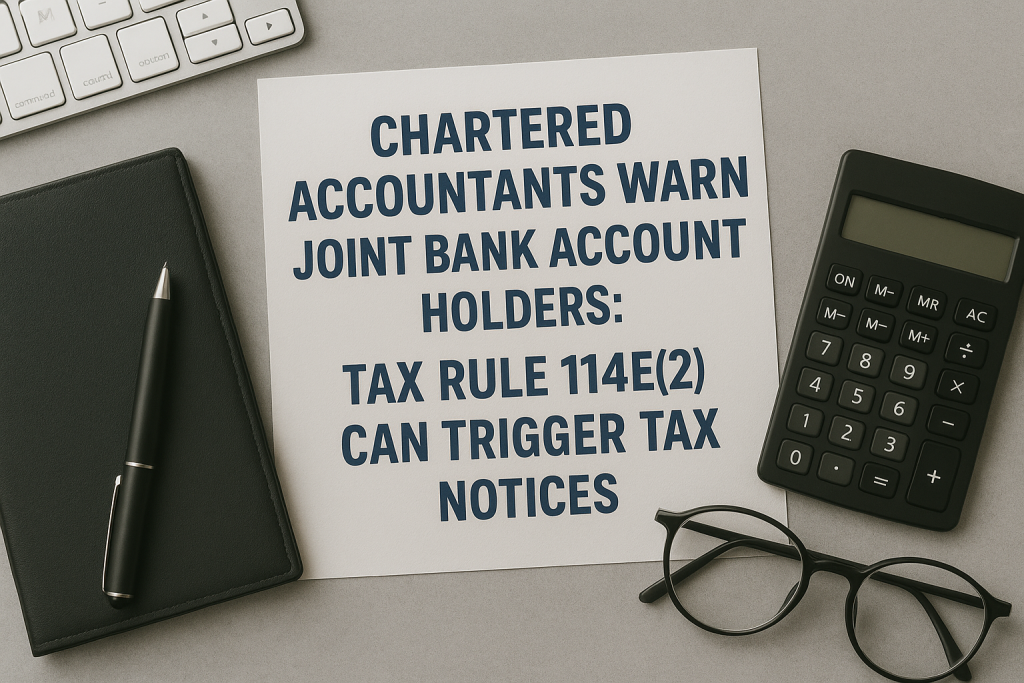Chartered Accountants Warn Joint Bank Account Holders: Tax Rule 114E(2) Can Trigger Tax Notices

Are you a joint bank account holder? Are you worried about getting unexpected tax notices—even when you haven’t made any high-value transactions yourself? Read on in simple English to understand the critical issue with Rule 114E(2) and how you can protect yourself and take immediate action.
What Is the Problem With Joint Accounts and Tax Notices?
- Rule 114E(2) of the Income Tax Rules says that banks and financial institutions must report any high-value transaction (over ₹10 lakh in a financial year) to the tax department. This is done through a system called Specified Financial Transaction (SFT) reporting.
- If two people hold a joint bank account and a deposit or investment crosses this threshold—even if only one person actually made the deposit—the bank reports the entire transaction under the names and PANs of BOTH account holders.
- So, if you are a joint holder and your spouse deposits ₹10 lakh, both your Annual Information Statement (AIS) will show ₹10 lakh.
- This has led to duplicate reporting for joint holders, and many people—especially elderly spouses or those who don’t file tax returns—are now receiving tax notices from the Income Tax Department.[1][2][3]
Why Is this a BIG Problem?
- You may get a tax notice for money you did not deposit or invest!
- This problem is hitting senior citizens hard, as they are often added as joint holders for convenience or succession planning, even when they have no independent income.
- The Income Tax system currently has no mechanism to identify the real owner of the money in joint accounts.
- When the tax department sees a big deposit under your name, they may send you a notice—even if you did not make the deposit![4][5][3]
How Rule 114E(2) Works: Simple Example
Imagine your husband deposits ₹10 lakh in your joint account. The AIS of both you and your husband will show the ₹10 lakh. If you are not an income taxpayer, you may get a notice or a query from the Income Tax department asking you about the source of this money—even though you didn’t make the deposit!
Who is most at Risk?
- Senior citizens and homemakers who are joint holders but do not have taxable income.
- Anyone who is listed as a joint account holder—regardless of age, income, or actual investment activity.
- People who don’t regularly file tax returns, like non-working spouses or family members.
- Even young or low-income individuals can be affected if their PAN is linked to high-value transactions in a joint account.
What Should You Do RIGHT NOW If You Have a Joint Account?
- Review Your Annual Information Statement (AIS) & Taxpayer Information Summary (TIS)
- Download and check your AIS/TIS for any entries that do not actually belong to you but might be due to joint account reporting.
- Give Correct Feedback in AIS
- If any transaction in AIS is not yours, mark it in the feedback options as “Information relates to other PAN.” This tells the department you did not make the investment.
- Report Income Correctly
- While filing your Income Tax Return (ITR), only the person who actually made the investment or received the income should report it.
- Do NOT report interest, dividends, gains, or other income if you did not contribute to the account or make the investment.[3][1]
- Consider Voluntary ITR Filing
- If you see big transactions in your AIS—because you are a joint holder—even if you have no taxable income, file your return voluntarily to explain the source and avoid future notices.
- Keep Proper Records
- Maintain clear records showing who made the deposits, investments, or purchases linked to the joint account.[1][2]
- This can include bank statements, account notes, proof of deposit, and investment statements.
How To Take Action—Step-by-Step
- Log in to the Income Tax website and download your AIS/TIS.
- Go through each item in AIS. Mark things you didn’t do as “Information relates to other PAN.”
- If your spouse or family member is the actual investor, keep all receipts and investment proofs.
- For any confusing or high-value transaction, file your ITR—even if you are not required—to explain everything to the tax department upfront.
- Consult a Chartered Accountant or tax advisor if you receive a notice or if the issue is complicated.
Why Does the Problem Exist?
- Banks have to follow the law and report any transaction over ₹10 lakh for ALL joint holders, even if only one contributed money.
- The Income Tax Department has not provided clear ways for banks or taxpayers to say who is the real owner or contributor.
- The current system works well for solo accounts, but fails for joint accounts with non-contributing holders like retirees and homemakers.
What Do Experts and Chartered Accountants Suggest?
- There needs to be a new method for mapping joint accounts and assigning ownership, just as TDS (tax deducted at source) tracking is done for individuals.
- Policymakers should fix Rule 114E(2) to make things easier for joint holders, especially seniors and non-filers.
- Until the rules change, follow the steps above to avoid trouble.
Important Notes for Joint Account Holders
- You are responsible for inspecting your AIS and giving feedback—even if you did not make the deposit.
- Filing your ITR voluntarily can help avoid future issues.
- Keep all your financial records in order.
- Seek help if you receive a tax notice.
Final Words
If you are a joint bank account holder, take action TODAY:
- Check your AIS/TIS
- Give feedback for incorrect entries
- File your tax return if needed
- Maintain records
Policymakers and the Income Tax Department must fix this issue to protect innocent joint holders, especially senior citizens, from unnecessary stress and paperwork.
Act Early—Prevent Trouble. As your financial advisor, I urge you to be proactive and smart!



